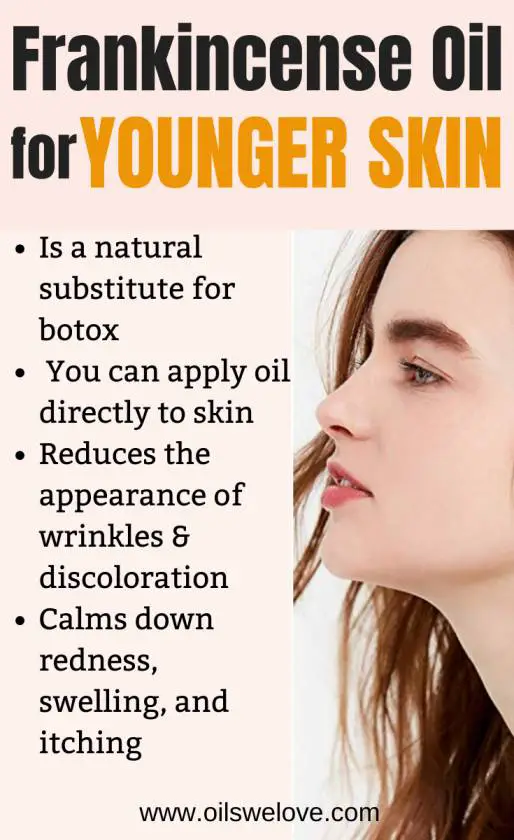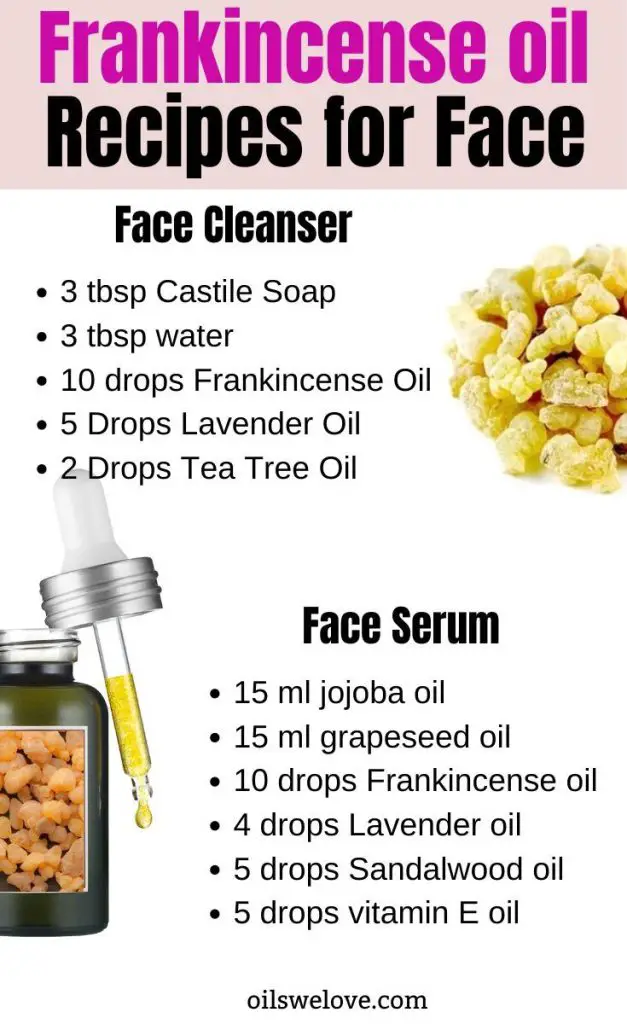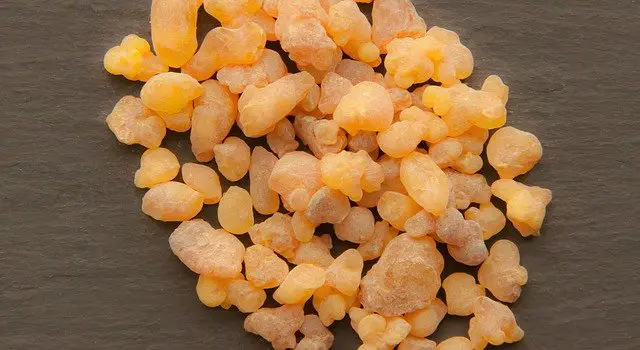How to use frankincense oil on the face to get rid of acne, oily skin, dull and aged skin look? Frankincense essential oil has plenty of benefits fro skin.
We have all heard of the run of the mill garden oils like Aloe Vera oil, Argan oil, Coconut oil, and Tea tree oil featuring in your grandma’s natural beauty recipes and found in almost all beauty products. But what about Frankincense oil – the black sheep of the essential oil family?
In recent years, the traction Frankincense essential oil has gained amongst beauty bloggers has a lot to do with the discovery that this black sheep is actually the golden child – the star ingredient of natural skincare products which has been under the radar until recently.

- 2-Week anti-inflammatory meal plan.
- 45 Foods that Cause Inflammation
- 31 Things to Avoid on Food Labels
- Grocery Lists. Challenges. Symptoms Tracker
Obtained from the resin of the Frankincense tree, this essential oil is found in Africa and the Middle East. It has a strong musky aroma played up by a fruity and spicy flavor. The sedative fragrance of the oil stimulates the nervous and the respiratory system.
How is Frankincense Essential Oil Extracted?
Boswellia and Commiphora trees are cut, and the sap that oozes out of the bark is allowed to harden. The raw Frankincense resin crystals are then crushed to give powder form and given an oil bath at the distillery plant. There, it undergoes steam distillation and CO2 extraction to produce perfumed Frankincense essential oil.
The best time to harvest Frankincense essential oil is right after the summer rain.
Pin this image to your Beauty or Essential Oils board on Pinterest!

What are the Health Benefits of Frankincense Essential Oil?
Frankincense oil is claimed to offer a host of health benefits. One of the major components of Frankincense, boswellic acid, contains anti-inflammatory and anti-tumor properties. Frankincense oil may prove to be beneficial for the following medical conditions:
Frankincense Essential Oil for Cancer
According to laboratory research performed on human cells, it was discovered that Frankincense essential oil has cancer-fighting properties that could provide protection against breast cancer and pancreatic cancer.
Moreover, as per a study published in the Complementary Therapies in Clinical Practice (2016), a blend of essential oils, including Frankincense oil, may induce sleep in people suffering from cancer.
Osteoarthritis
Frankincense essential oil’s anti-inflammatory properties may help with osteoarthritis and knee pain. According to a review of published studies (2018), it was found that Boswellia extract may significantly reduce pain for a short time period. However, there is still a lack of evidence to prove the efficiency of Frankincense essential for long-term pain reduction.
What are the Uses of Frankincense Essential Oil in Aromatherapy?
Here are a few of the common uses of frankincense essential oil in aromatherapy:
- Acne
- Anxiety
- Cold
- Cough
- Indigestion
- Ulcer
In recent years, frankincense oil has attracted major attention from all-natural skincare companies. Most claim it could treat dry skin and has anti-aging properties that could reduce wrinkles, age spots, acne scars, and stretch marks.
Today, Frankincense oil is one of the major ingredients of some of the best-selling beauty products for its anti-inflammatory and healing properties.
How to use frankincense oil on the face?
Frankincense is an anti-inflammatory oil with soothing properties. It reduces redness and irritation of inflamed skin and helps bring down swelling and itching. Its antibacterial properties disinfect skin, tighten pores, and prevent wrinkles.
This essential oil promotes speedy healing of cuts, wounds, and acne scars. Its stimulating properties treat gastrointestinal issues, promote the growth of new skin cells, and regulate blood circulation in the body.
Frankincense essential oil for skin shows its universality: for owners of oily, problem skin, it helps to cope with inflammation and pimples, and those who suffer from dryness of the skin, gives an opportunity to tighten it, tone it up, “revive”, make it firmer and younger-looking.

In addition, Frankincense oil is often added to treatments for dermatological diseases – from eczema to psoriasis and rash.
Frankincense essential oil can be added to the natural base (cream without the addition of synthetic ingredients) – at the rate of 3-4 drops per 10 ml or can be mixed with oils and other essential oils for home masks. In this case, you will need 1 tbsp of base oil (sweet almond, jojoba, etc.), 2 drops of incense essential oils – and other essential oils as needed (e.g. lavender oil is suitable if you need to soothe irritated skin, and neroli oil – if you want to soften dry skin).
Buy Frankincense Essential Oil HERE
Does Frankincense Essential Oil Get Rid of Acne?
Known for its anti-inflammatory properties, Frankincense oil is gentle on the skin and goes with most skin types. It naturally heals wounds and reduces scarring. An ideal option for popped zits and inflamed pimples; Frankincense oil soothes skin and balances the production of sebum.
It also provides relief from dry, irritated skin and treats inflamed acne. The boswellic acid kills the bacteria associated with acne and prevents further acne formation on the skin.
The best effect would be reached if you mix frankincense oil with the carrier oil, which is also suitable for acne-prone skin, for example, evening primrose oil.
Can I Use Frankincense Oil Directly on My Skin?
Frankincense essential oil is mild in nature and most people apply a few drops directly on the skin without having to face any side effects. However, if your skin is sensitive and reacts immediately to foreign chemicals, you can use Frankincense essential oil with carrier oils such as fractioned coconut oil, almond oil, jojoba oil, olive oil, or grapeseed oil.
You must not apply the oil anywhere close to your eyes as the vapors may irritate the eyes and the area around it.
If you experience burning, tingling or irritation from Frankincense oil, contact your caregiver.

Is It Safe to Ingest Frankincense Essential Oil?
While a lot of essential oil companies claim that the ingestion of Frankincense oil is healthy for a wide variety of health-related concerns, the evidence is still lacking. Besides claims and promises, there is no factual evidence that supports the safety and efficacy of ingesting Frankincense essential oil to treat ailments.
However, if you do still ingest this essential oil, be sure it is pure and bought from a trustworthy retailer. Carefully follow the manufacturer’s directions and book an appointment with your doctor to weigh out the pros and cons and test for allergies before use.
What are the Possible Side Effects of Frankincense Essential Oil?
Although the research on Frankincense oil is still lacking, ingesting it may result in toxic effects on the human body. Unless you are advised by a doctor to do so, do not ingest Frankincense essential oil, especially undiluted.
The topical application of Frankincense essential oil can cause an allergic reaction on the skin. As a result, the skin gets inflamed, you develop rashes, and the condition gets worse. The best way to ensure nothing as such happens is to do a patch test before applying any essential oil on your face.
No matter how gentle, essential oils, including Frankincense, are potent extracts, and must not be used on the skin undiluted. It is best to contact your caregiver and have them rule out possible allergies before application. It is extremely important for pregnant women and nursing moms to get a second opinion from their health care providers before using essential oil.
Moreover, never self-treat a medical condition with Frankincense or any other essential oil without discussing it with your doctor first or by delaying your doctor’s visit. This sort of neglect can result in serious consequences for you.
The Bottom Line
In recent years, Frankincense essential oil has gained a lot of attention due to its anti-inflammatory and anti-aging properties. It treats inflamed acne, disinfects the skin, and prevents more acne pimples from popping up on your skin. The research is still in progress and not many claims are supported by scientific backing, yet the popularity garnered by Frankincense only continues to increase.
However, before applying Frankincense oil on your acne-prone skin, it is best to have a chat with your dermatologist. They can help identify underlying skin conditions like eczema, rosacea, or psoriasis and rule out possible allergies.
Disclaimer: The contents of this website are for informational purposes only and do not constitute medical advice; the content is not intended to be a substitute for professional medical advice, diagnosis, or treatment. Always seek the advice of a physician or other qualified health provider with any questions you may have regarding a medical condition.






